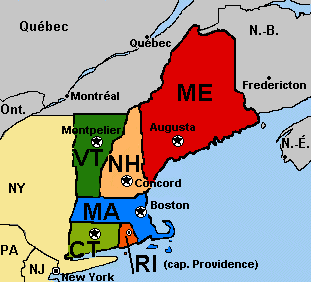 |
Craig White's Literature Courses Historical Backgrounds
New England |
 |
The states of New England include Massachusetts, Connecticutt, Rhode Island, New Hampshire, Vermont, and Maine.
However, many Americans outside New England mistakenly assume that New England and "the Northeast" are one and the same, often including New York, Pennsylvania, New Jersey, and / or Delaware as part of New England.
Historically those states (NY, PA, NJ, & DE) are not New England—The states of New England were founded primarily by English Puritans. New York was founded by the Dutch, Pennsylvania by English Quakersetc.—but over the centuries till now the entire region shares some resemblances:
![]() Among
nation's oldest colonies / states—all but Maine were part of the 13 original
states of the USA.
Among
nation's oldest colonies / states—all but Maine were part of the 13 original
states of the USA.
![]() Aging populations
with mature, slow-growth economies, higher education, widespread use of
birth control resulting in smaller families.
Aging populations
with mature, slow-growth economies, higher education, widespread use of
birth control resulting in smaller families.
![]() Community-oriented,
stable lifestyles and progressive social support networks compared to
go-it-alone individualism and mobility of West and reactionary social
conservatism of South.
Community-oriented,
stable lifestyles and progressive social support networks compared to
go-it-alone individualism and mobility of West and reactionary social
conservatism of South.
Originally, New England was the 6 states settled by English immigrants, most of them Puritans or descended from Puritans: Massachusetts, Connecticut, Maine, New Hampshire, Vermont, & Rhode Island. (All these states' populations diversified over time; e.g. Irish, French-Canadian, and other trans-Atlantic immigrants.)
Especially because of the age, relative stability, small size, and support for public education in New England states, this region sometimes seems more European than American, if "American" is defined by the mobility, hyper-growth, individualism, anti-intellectual, and anti-government attitudes of the South and West.
States influenced by New England are the "northern tier" of progressive or liberal states, including Illinois, Wisconsin, Minnesota, and to a lesser extent Iowa, Nebraska, Oregon, and Washington state. The New England influence occurred mostly through migration, some religion, public education, and higher education.
New England literary tradition
The Puritans were never a majority of the U.S. population, but their community-mindedness and support for universal literacy, public education, and higher education have often given them a disproportionate influence in the nation's political and literary life. Across American history, however, power has tended to shift from the Northeast to the South and West.
If you're a student of early American literature—literature before the Civil War—you are often in fact a student of the literature of New England, with the exceptions of Poe (of Virginia) and some New York writers.
Following is a very incomplete list of
writers who are associated with New England (not including NY or PA).
Aside from the first generation of Puritans, who
were born in England, most of these authors were born in New England and lived
there; a few were born elsewhere of families originally from New England; and
several are not English in descent.
Seventeenth Century:
William Bradford, Anne Bradstreet, Mary Rowlandson, Edward
Taylor, Cotton Mather, many others
Eighteenth Century:
Jonathan Edwards, John and Abigail Adams, John Quincy
Adams, Timothy
Dwight, Phyllis Wheatley, Royall Tyler, Joel Barlow, Hannah Webster Foster,
Susannah Rowson, Prince Hall
Early
Nineteenth Century ("American Renaissance" or "New England Renaissance")
Later
Nineteenth Century
plus or minus
Henry James, Edith Wharton, William Dean Howells, even Mark Twain
Early Twentieth Century:
Robert Frost, Wallace Stevens, T. S. Eliot, Marianne
Moore, W. E. B. Du Bois, e e
cummings, Amy Lowell, Mary Antin (immigrant to Boston from Belarus)
Mid-Twentieth Century:
Robert Lowell, Conrad Aiken, Elizabeth Bishop, Jack
Kerouac, Charles
Olson
Late Twentieth Century:
John Irving, Robert
Creeley, Thomas Pynchon, Stephen King, Mary Oliver

Early New England